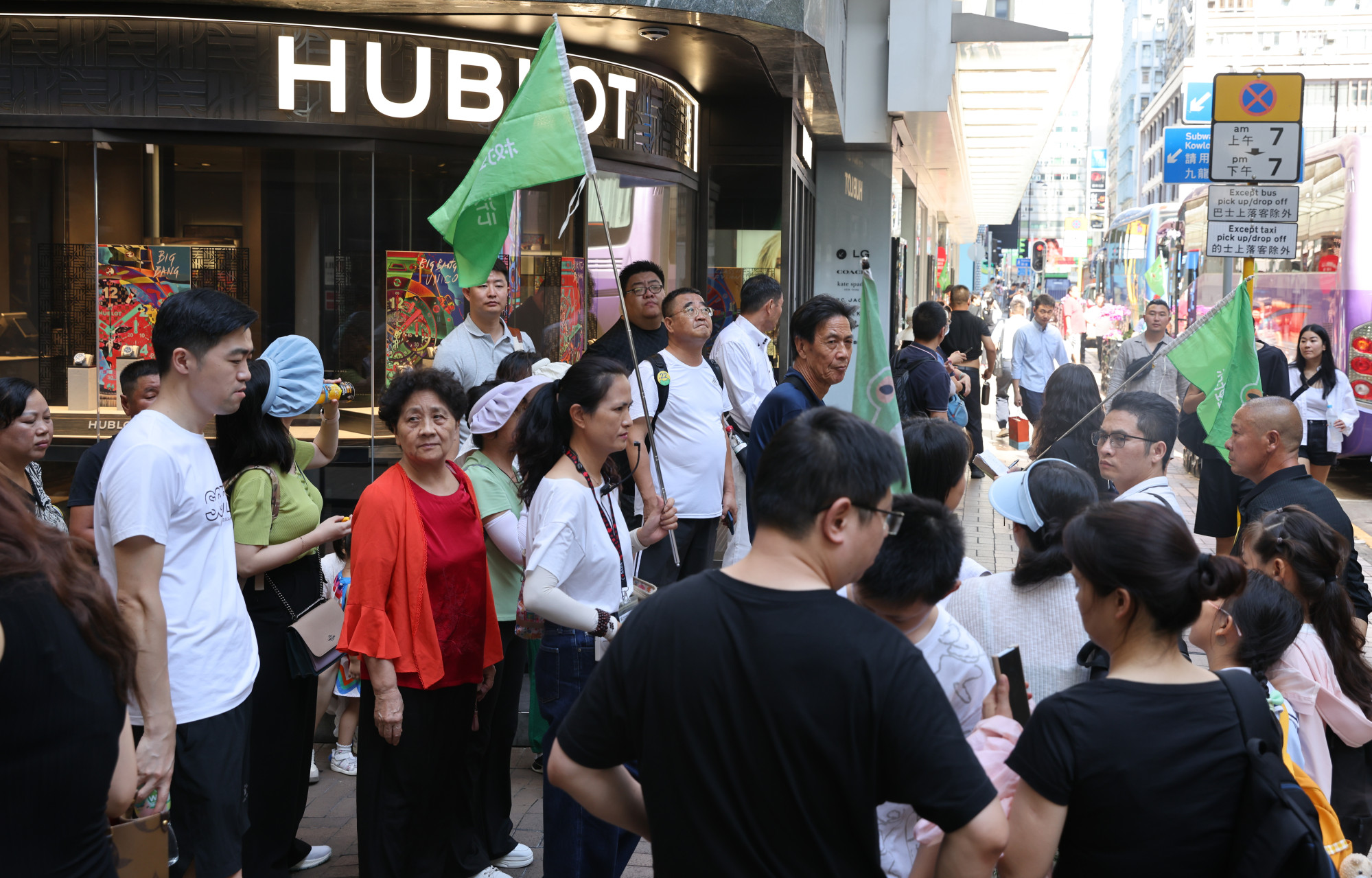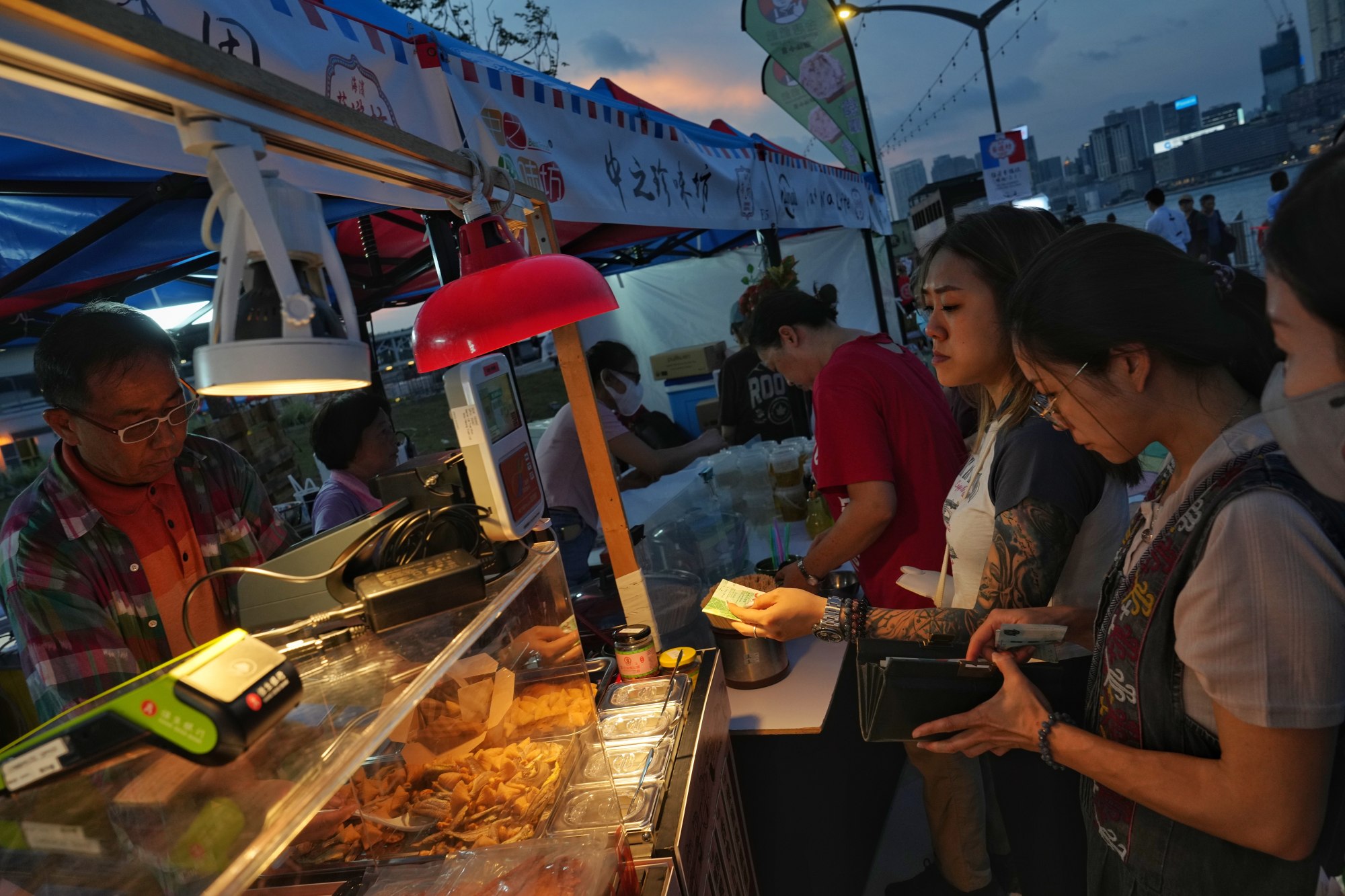
Almost 1 million people leave Hong Kong for holiday long weekend as mainland Chinese tourists hit city as part of ‘golden week’ break
- Secretary for Culture, Sports and Tourism Kevin Yeung on Saturday says more than 700 mainland tour groups expected to arrive in the city in next few days
- About 122,877 mainland visitors arrive in Hong Kong on Friday, first day of their eight-day ‘golden week’ break
Almost 1 million people left Hong Kong on Friday and Saturday and more than 600,000 arrived as the city and mainland China started their first post-coronavirus Mid-Autumn Festival and National Day holidays.
Immigration Department figures showed 612,323 people arrived in the city over the two days and 936,081 had left, a net outflow of more than 323,000.
Many residents who travelled to Shenzhen for the long weekend said they found the attractions in the mainland city more appealing, but most visitors to Hong Kong from across the border interviewed by the Post travelled independently and said they only planned to stay for a day.
There were 338,560 Hong Kong residents who departed the city on Friday, the start of the three-day weekend, a 35 per cent week-on-week increase.
About 122,877 mainland visitors entered Hong Kong on the same day, the first day of the eight-day National Day “golden week” holiday across the border, a 56 per cent week-on-week surge.
A total of 503,169 travellers had departed the city by 9pm on Saturday and 322,251 arrived, but the breakdown by residents and mainland visitors was not yet available.

Zhang Guangxin, 42, who arrived in the city from Dongguan on Saturday with his wife, 14-year-old daughter and son, 12, said Hong Kong was just one of his destinations during the mainland’s golden week.
“We may go to visit other mainland cities after Hong Kong,” he said.
He added the family had come to Hong Kong because his children had never visited the city.
The Immigration Department had predicted 6.55 million people would cross the city’s border in both directions over the eight-day period.
The Travel Industry Council earlier estimated there would be about 1 million tourists from across the border, which amounted to 70 per cent of pre-pandemic levels for the same period.
Hong Kong in 2018 recorded 3.4 million arrivals over the golden week holiday, with 1.5 million of them from the mainland. An average of more than 200 tour groups from the mainland visited the city every day.
Secretary for Culture, Sports and Tourism Kevin Yeung Yun-hung on Saturday told a radio programme that more than 700 mainland tour groups were expected to arrive in the city in the next few days, compared with about 453, made up of about 14,000 people, who visited Hong Kong over the Labour Day golden week in May.
But he highlighted that tour groups in general accounted for only a small percentage of tourists from across the border.
“Independent visitors accounted for more than 90 per cent of mainland arrivals and it’s only about five per cent for tour groups,” Yeung explained. “With more people travelling independently, we need all Hong Kong residents to serve tourists well together.”
He said the shift to independent travel had made city attractions that showed “how we live and where we go” more popular.
No plans for Hong Kong’s National Day long weekend? Here are some ideas
Yeung added that a recent Tourism Board promotion focused on culture and nature in the city had attracted about 200 million views on Xiaohongshu, the mainland’s Instagram-like social media platform.
The minister said he hoped the government’s “Hong Kong Night Vibes” campaign, designed to help kick-start the after-dark economy, would boost tourism.
But he said he had observed that many attractions popular with mainland travellers had built up momentum organically.
“The reason why Sham Shui Po is becoming a [tourist hotspot] is because many local young people have been visiting cafes with ‘hipster’ vibes. Hong Kong people have always made good use of the city’s attractions,” Yeung added.
National Day long weekend to give HK$1.2 billion sparkle to Hong Kong dining
But independent mainland travellers who opted for smaller city restaurants over larger ones had contributed to a 25 per cent drop in per-head spending by tourists on food compared with pre-pandemic levels, according to Simon Wong Ka-wo, president of the Hong Kong Federation of Restaurants and Related Trades.
Wong told a TV programme that the National Day fireworks on Sunday night – the first since 2018 – could lead to a 20 per cent boost in business for eateries on both sides of the Victoria Harbour.
He also expressed confidence that a string of night activities would convince Hongkongers to spend more.
“Local residents who remain in Hong Kong will go out to spend money if they are in a happy mood, building up the good vibes,” he said.

Timothy Chui Ting-pong, the executive director of the Hong Kong Tourism Association, said on Saturday that organised tours in general would spend one or two days in Hong Kong, with most group tourists coming from outside Guangdong province.
He explained that there were usually fewer tour groups during golden week travel peaks because the mainland’s high speed rail operator would reserve fewer tickets for tour operators, which would restrict the number of groups.
Transport secretary Lam Sai-hung on Saturday said on social media he had inspected the operations at Hong Kong’s high-speed railway station in West Kowloon.
Lam said authorities were working with public transport operators to ensure there would be enough capacity to cope with the National Day travel surge in demand.



